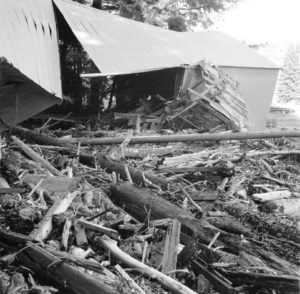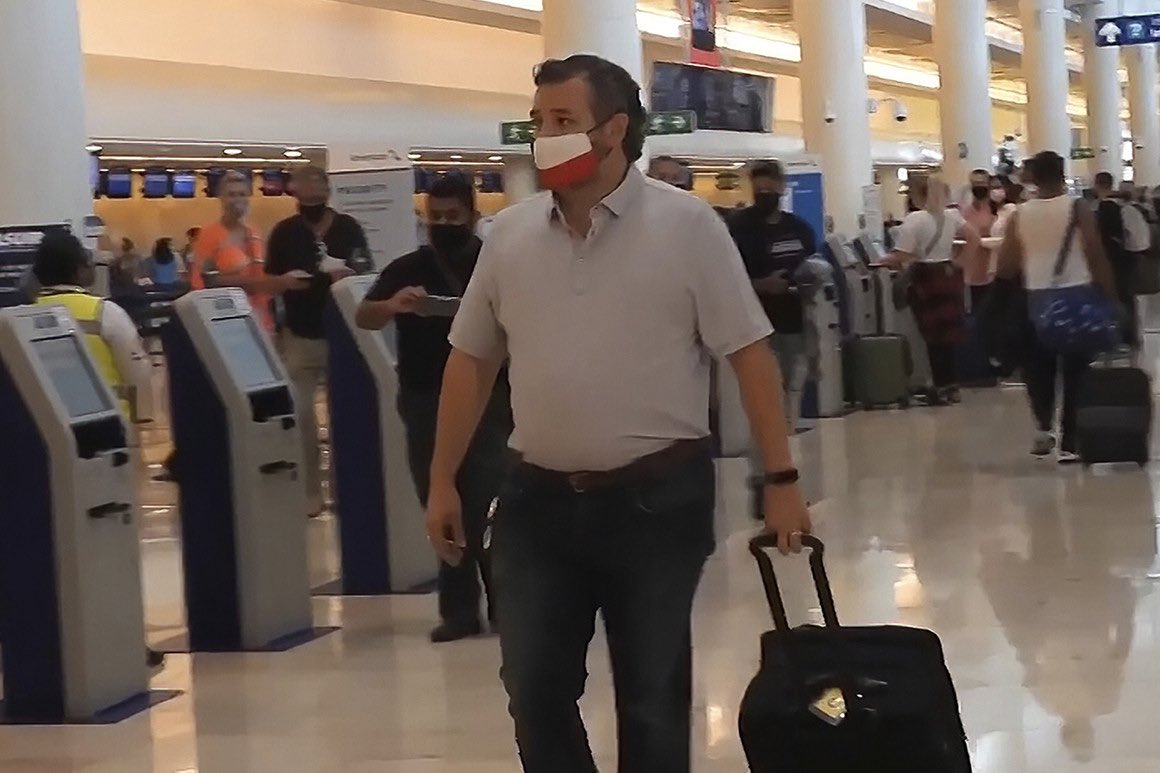The inspecting bigwigs’ helicopter landed after circling over a badly flooded Sacramento River delta, with Governor Edmund G. “Pat” Brown striding up to the television cameras and declaring:

“My God, this is the worst disaster to hit California since I became Governor.”
Natural and man-made calamities can be a disaster for presidents, governors and mayors but also, less frequently, make their careers.
The delivery of relief is paramount but so is attitude and expression, as Senator Ted Cruz of Texas discovered leaving frozen Houston for sunny Cancun last week.
Whatever cuts have been made to it, government is expected to mitigate “acts of God” and the human caused.
When Cruz voted in the Senate against aid to states stricken by Hurricane Hugo, Governor Chris Christie of New Jersey delivered a warning: Coming from a coastal state, Cruz would someday find himself coming hat in hand for help. The day came five years later when Houston was inundated by Hurricane Harvey.
President George W. Bush, flying high after his 2004 reelection, was brought to earth by the federal government’s negligent and disorganized response when the catastrophe of Hurricane Katrina hit New Orleans.
He flew over the city, then told his crony, the overmatched FEMA boss Mike Brown: “Brownie, you’re doing a heckuva job.” He wasn’t.
Buck passing is instantly recognized, such as when Texas Governor Greg Abbott went on Fox News last week and tried to blame green energy and frozen wind turbine blades for his state’s power calamity. Of course, properly weatherized wind farms were operating from Alaska to Minnesota to Maine.
Texas gas pipelines and a nuclear power plant were down, and the state’s go-it-alone electrical grid was not positioned to secure power from other states.
A sense of being thrown a lifeline has major impact.
After the I‑5 Skagit River Bridge collapsed, our senators made late night calls to the Undersecretary of Transportation and found that emergency aid was available for just such an occurrence. Senator Maria Cantwell, D‑Washington, drove up to Skagit County carrying a commitment of the first million dollars.
Another example: Darrington is a timber town usually tough on Democrats. A yard behind the U.S. Forest Service ranger station became a center for directing rescue operations following the 2014 Oso landslide.
A gang of locals sang praises of U.S. Representative Suzan DelBene, D‑Washington, for quickly getting hands on resources they needed. The former tech executive doesn’t deliver snarky quotes, but delivered help.
Let’s look at a few notable cases of mishandled and handled responses, both here and elsewhere in the United States, over the past few decades.
Chicago, 1979
A fierce 1979 Chicago blizzard froze the Democratic political machine built by the late Mayor Richard J. Daley.
When told residents of his Bridgeport neighborhood were waiting for buses that did not come, Mayor Michael Bilandic said they should walk. Buses rolled through minority neighborhoods without stopping, bound for the suburbs.
“I was a victim of the snow, not of my operations or anything personal,” Bilandic said after losing a February primary to insurgent Jane Byrne.
Seattle, 2008
The December 2008 Arctic blast, which paralyzed the city, put Mayor Greg Nickels on a downhill trajectory. He did not survive the Top Two election eight months later. Nickels made the mistake of giving himself a “B” grade in mid-crisis. The Seattle Department of Transportation director decamped to Portland for Christmas in the middle of the mess.
The Atlantic seaboard, 2012
The tidal surges inflicted by Hurricane Hugo on New Jersey and New York in October, 2012, saw a coordinated bipartisan response from Christie and President Obama. They were on the scene together almost instantly, channeling aid to the worst hit coastal communities. Obama would win a second term weeks later, and Christie a landslide reelection in 2013.
Christie got his comeuppance however.
The governor shut down Garden State beaches in 2017, muscling legislators during a state government shutdown. He was then photographed from the air with his wife Mary Pat enjoying a Sunday afternoon at Island Beach State Park.
“I have little sympathy for Ted Cruz because he made fun of my beach photos,” Christie said last week.
Puerto Rico, 2017
Attitude is everything. In 2017, Donald Trump tossed rolls of paper towels to a crowd at a church in Puerto Rico after the island was devastated by Hurricane Maria. The episode became a symbol of Trump’s inability to sympathize with the stricken, given his monumental self-absorption.
Trump would scoff at a water purification kit which helped save lives and gave himself an A+ grade on hurricane response.
First Lady Melania Trump would wear spike heels setting off on a trip to inspect the ravages of Hurricane Henry in Houston.
When disaster strikes, there is what clergy like to call a “ministry of presence.”
It helped a stricken valley when President Obama stopped, in route to a summit in Asia, to visit with Oso landslide recovery workers.
And for President Clinton to come calling when Cougar, Washington was inundated. When the Darrington High School baseball team played its first post-Oso game, Governor Jay Inslee and wife Trudi were in the stands.
It’s funny, too, how political opponents show up for photo ops. Ultraconservative U.S. Representative Linda Smith, R‑3rd District, hovered near Clinton when he visited the Southwest Washington flood site. State Senator Barbara Bailey, R‑Oak Harbor, showed up when Inslee inspected a Whidbey Island landslide.
Natural calamities show us that we need government.
In Texas, we have re-learned that crimping on preparation is enormously costly down the road, particularly to lower income residents and people of color.
The lesson had better take hold, since climate damage is making extreme conditions – more powerful hurricanes, extended wildfire fire seasons, and polar vortex events – the “new normal.”
Way back in 1965, I knelt in a Bellingham High School hallway as Western Washington was shaken by a fair-sized earthquake. Unlike Texas after its 2011 deep freeze, we took notice. The tremor prompted widespread retrofit of school buildings. By the time of the 2001 Nisqually Earthquake, we had safer school buildings and a rapid response plan in place. Lives were doubtless saved.
Will the country wake up to the need for infrastructure modernization following the horrors in Texas, or will we see right-wing politicians escape responsibility and go on demonizing clean renewable energy? After all, we have just witnessed the worst disaster to hit Texas since Greg Abbott was elected Governor.

